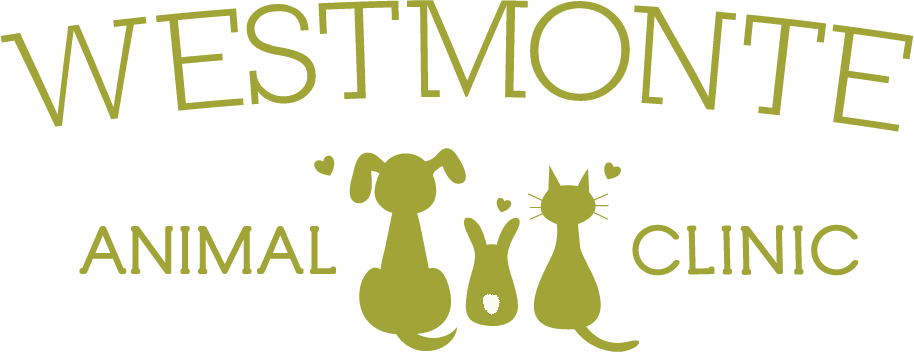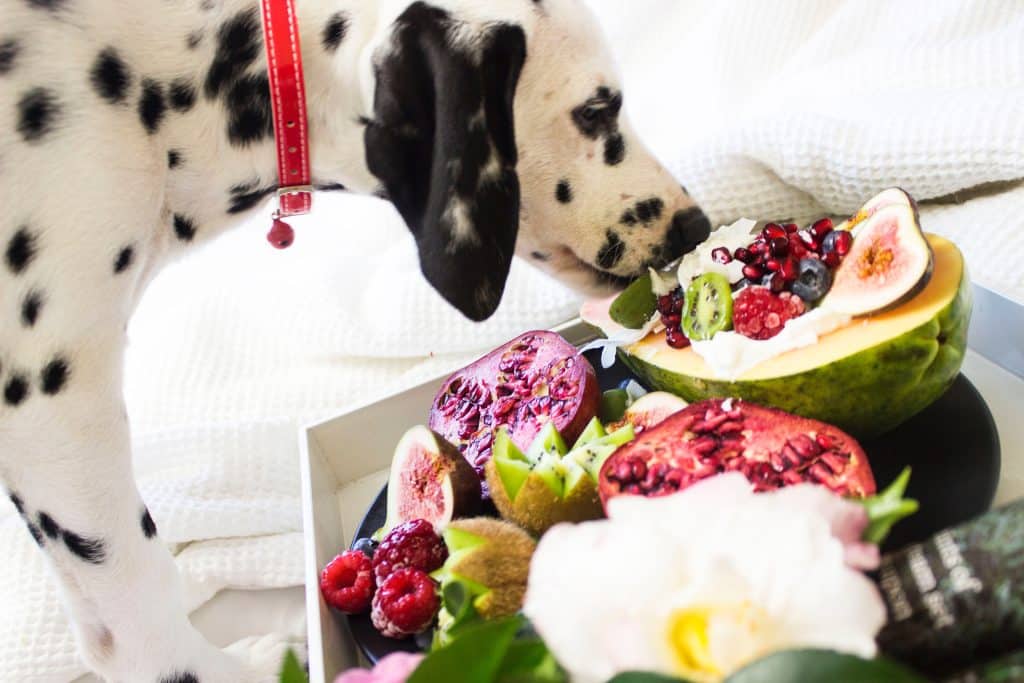
Can Dogs Eat Human Food?
Sharing is caring, and your dog deserves the best.
Which begs the question…can dogs eat human food?
Dogs eat a lot of odd stuff like grass or cat food, but part of the fun of having a dog is being able to include them in everything you do—including eating human food!
However, one thing pet owners fail to remember is that their dog is not only smaller than they are, she’s an entirely different species. Some of the things that are perfectly safe for you to eat can be extremely unhealthy (or even fatal) for your dog.
In this article, we’ll share some tips on how to share food with your dog safely.
Can Dogs Eat Human Food?
The question isn’t “can dogs eat human food?” but “Should they?”
Unfortunately, most human dishes are too rich or fatty for dogs and can cause symptoms such as upset stomach, diarrhea, and (in the best case scenario) extreme pickiness!
Not to mention, some of the ingredients that humans can’t get enough of are toxic to dogs.
That being said, there are some foods that offer amazing nutritional benefits to your pet. In fact, you may even hear your vet recommend giving your dog “human food” every once in a while.
So, how do you tell the difference between harmful and helpful?
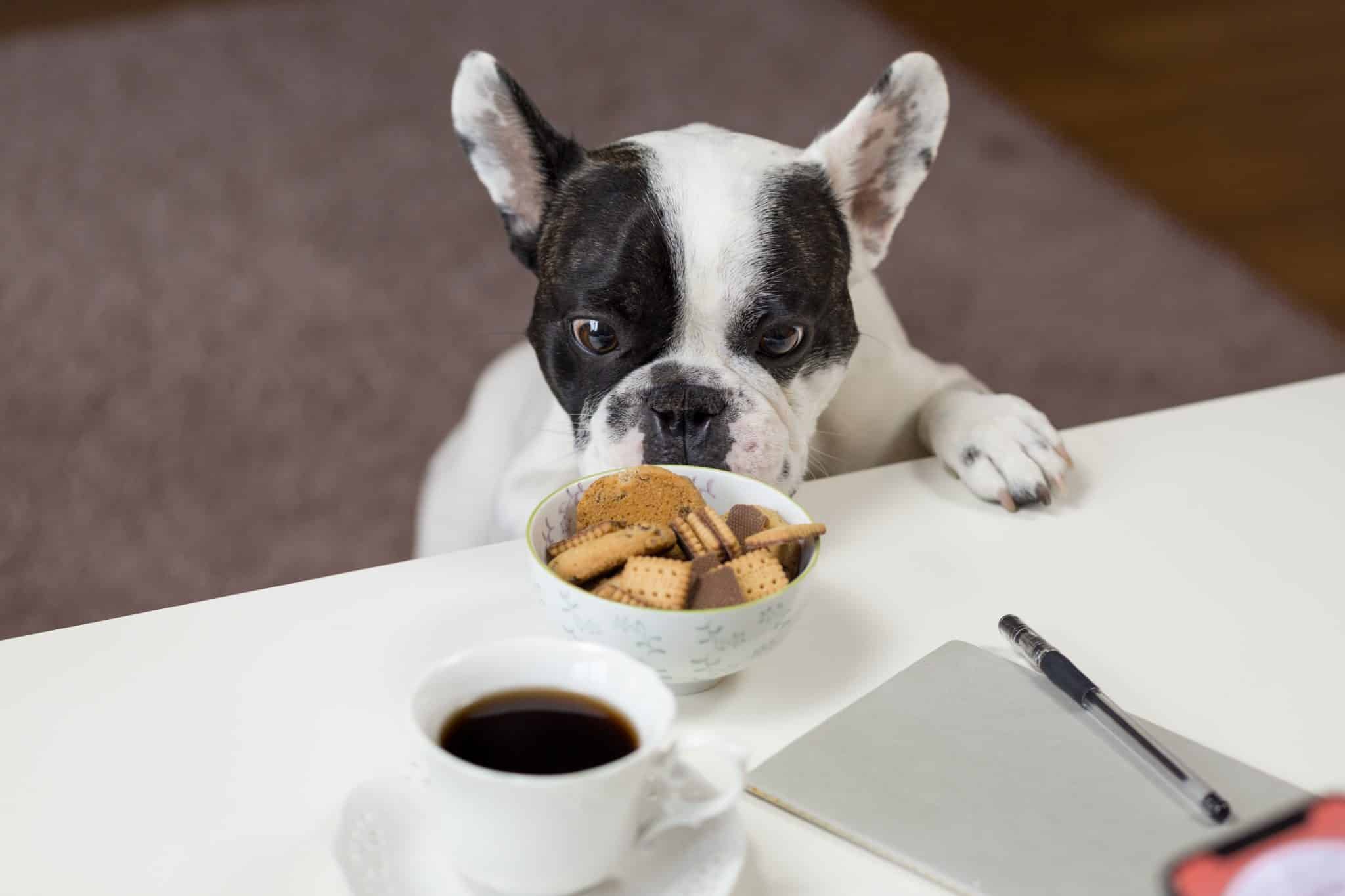
Red Light: Foods That Are Toxic To Dogs
The following foods are toxic to dogs and should be treated as such. Do not feed your dog any of the following ingredients and keep them out of reach of your pets.
If your dog does ingest any of these ingredients, contact your vet immediately.
Alcohol
You probably know that too much alcohol is harmful to humans but any amount of alcohol can be harmful to dogs. Their kidneys are unable to process alcohol, making it highly toxic.
Avocado
Avocados contain a chemical called persin that—while harmless to humans—is toxic to dogs. The skin and pit of an avocado contain a much higher concentration of persin than the flesh, but it’s still a safer bet to keep Fido away from the guacamole!
Caffeine
According to the Pet Poison Helpline, caffeine can cause rapid heart rate, high blood pressure, tremors, and even seizures in dogs.
Chocolate
In addition to caffeine, chocolate also contains theobromine, a toxin which dogs’ bodies cannot metabolize.
“But my neighbor’s dog once ate an entire chocolate Easter bunny and he lived nine more years!”
Chocolate toxicity varies based on your dog’s weight as well as the type and amount of chocolate eaten (for example, cocoa powder contains a lot of theobromine, white chocolate has virtually none). For more information, use PetMD’s Dog Chocolate Toxicity Meter to see if your dog is in the danger zone.
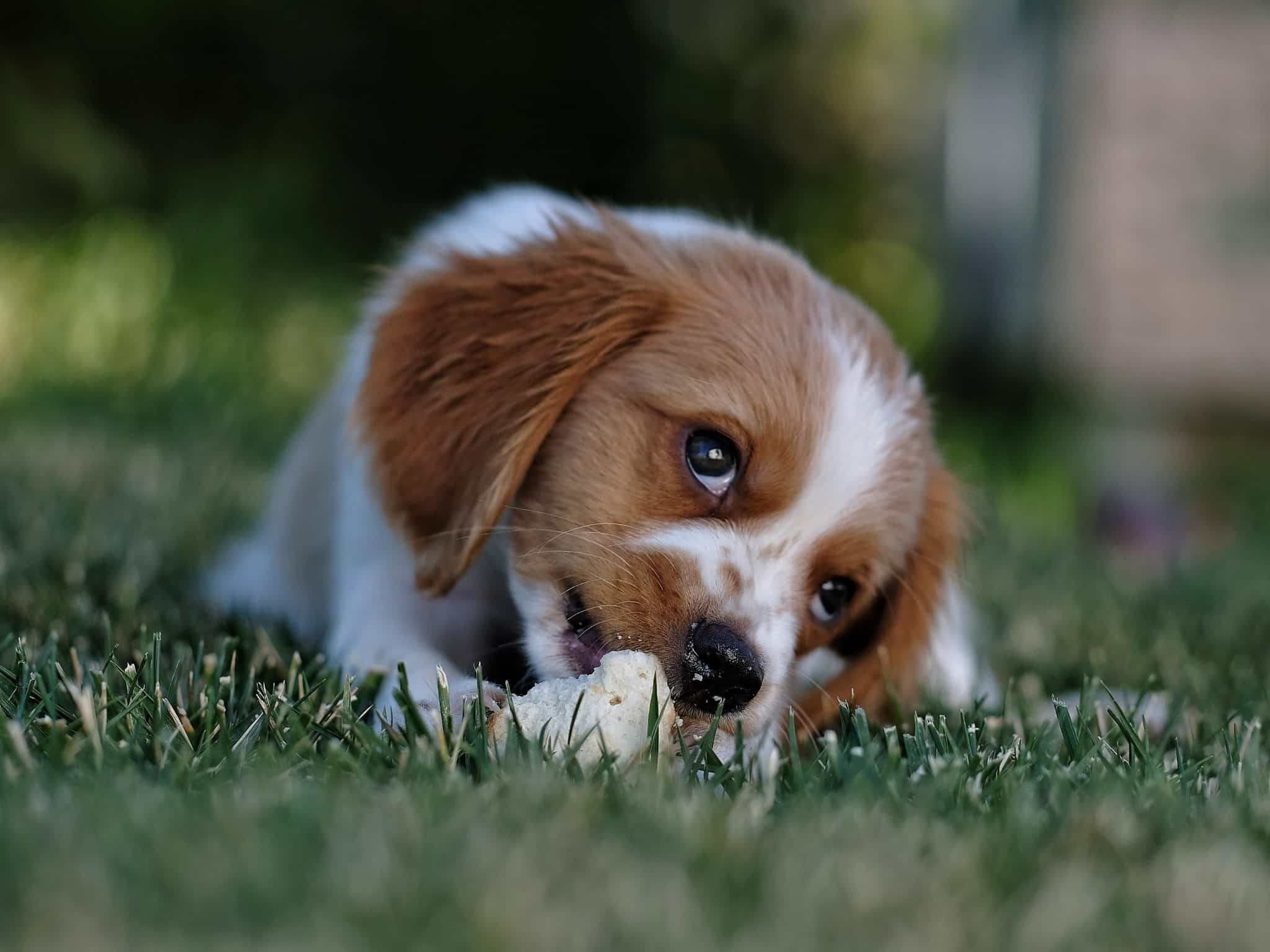
Cooked Bones
Dogs are well known for loving bones, but cooked bones are a no-no. No matter what animal they come from, cooked bones are more brittle than raw, making them much more likely to splinter and damage your dog’s digestive system.
Contrary to popular belief, dogs can get salmonella poisoning as well, so stay away from raw chicken bones.
Garlic
They might be a favorite in human cuisine, but members of the allium family (such as garlic, onion, chives, and leeks) are toxic to both dogs and cats.
Grapes/Raisins
While a good amount of fruits and vegetables are great for dogs, grapes are a different story.
For years, vets weren’t exactly sure why, but in 2021, researchers were able to pinpoint the cause: high concentrations of tartaric acid.
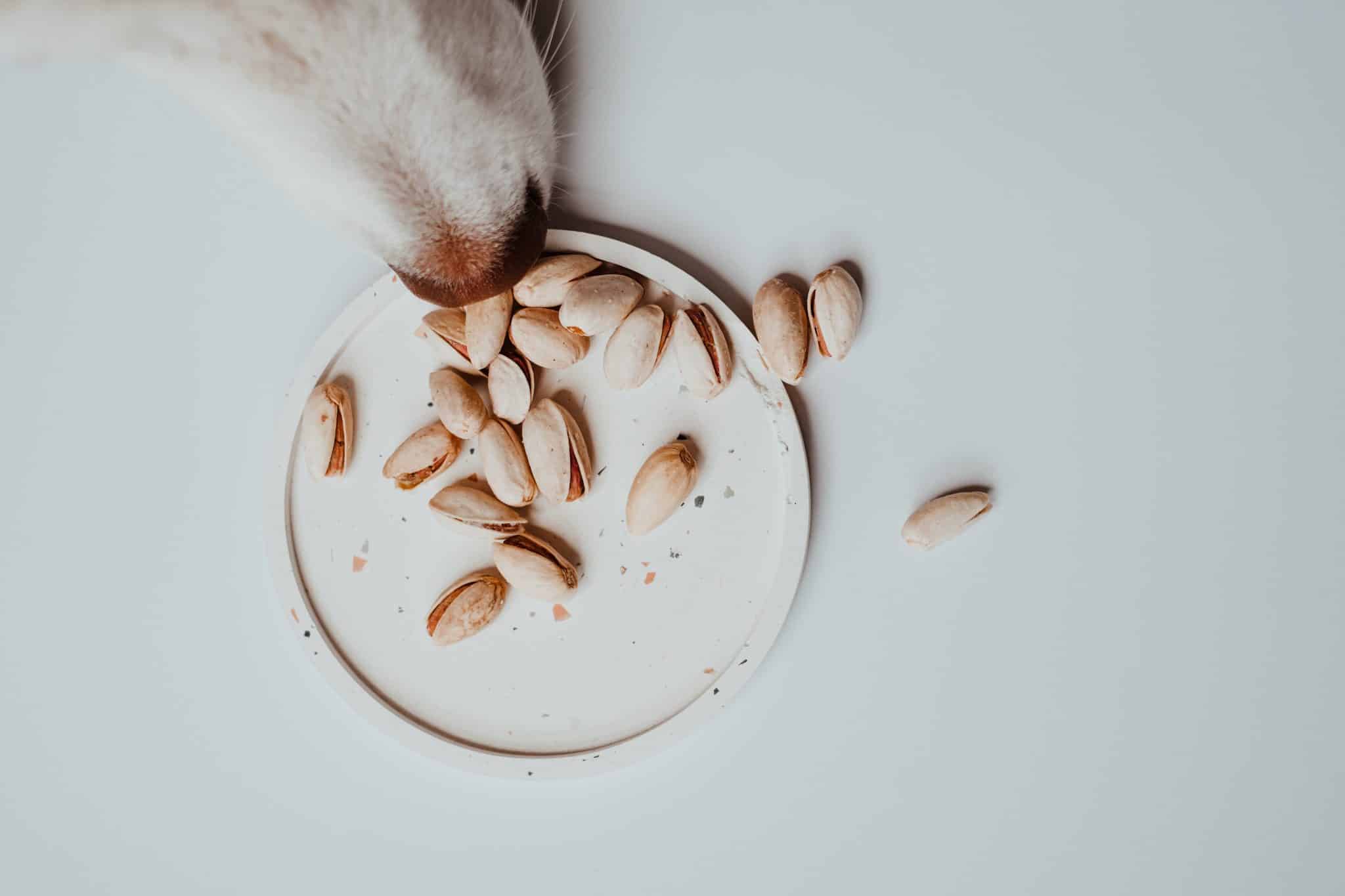
Nuts
While there are some types of nuts that are safe for dogs, there are an equal amount of nuts that are toxic to their systems. Macadamia nuts are highly toxic to dogs, as are black walnuts.
Even “safe” nuts—such as pecans and cashews—are too high in fat and salt to feed your dog regularly. There are better treats out there!
Xylitol
Most common in sugarless gum, xylitol is a sugar substitute that can cause vomiting and seizures.
Yeast
If you love to bake, guard your bread doughs closely. Yeast grows very well in warm, moist environments (such as your dog’s stomach). If s/he eats raw dough, it can lead to uncomfortable bloat and alcohol poisoning as the yeast consumes the sugars in the dough.
Yellow Light: Feed With Caution
While not toxic, the following ingredients are unhealthy, especially in large quantities. And remember, “large quantities” for dogs and humans look very different.
- Fat
- Sugar
- Salt
- Diary (many dogs are lactose intolerant)
- Fish (needs to be cooked well)
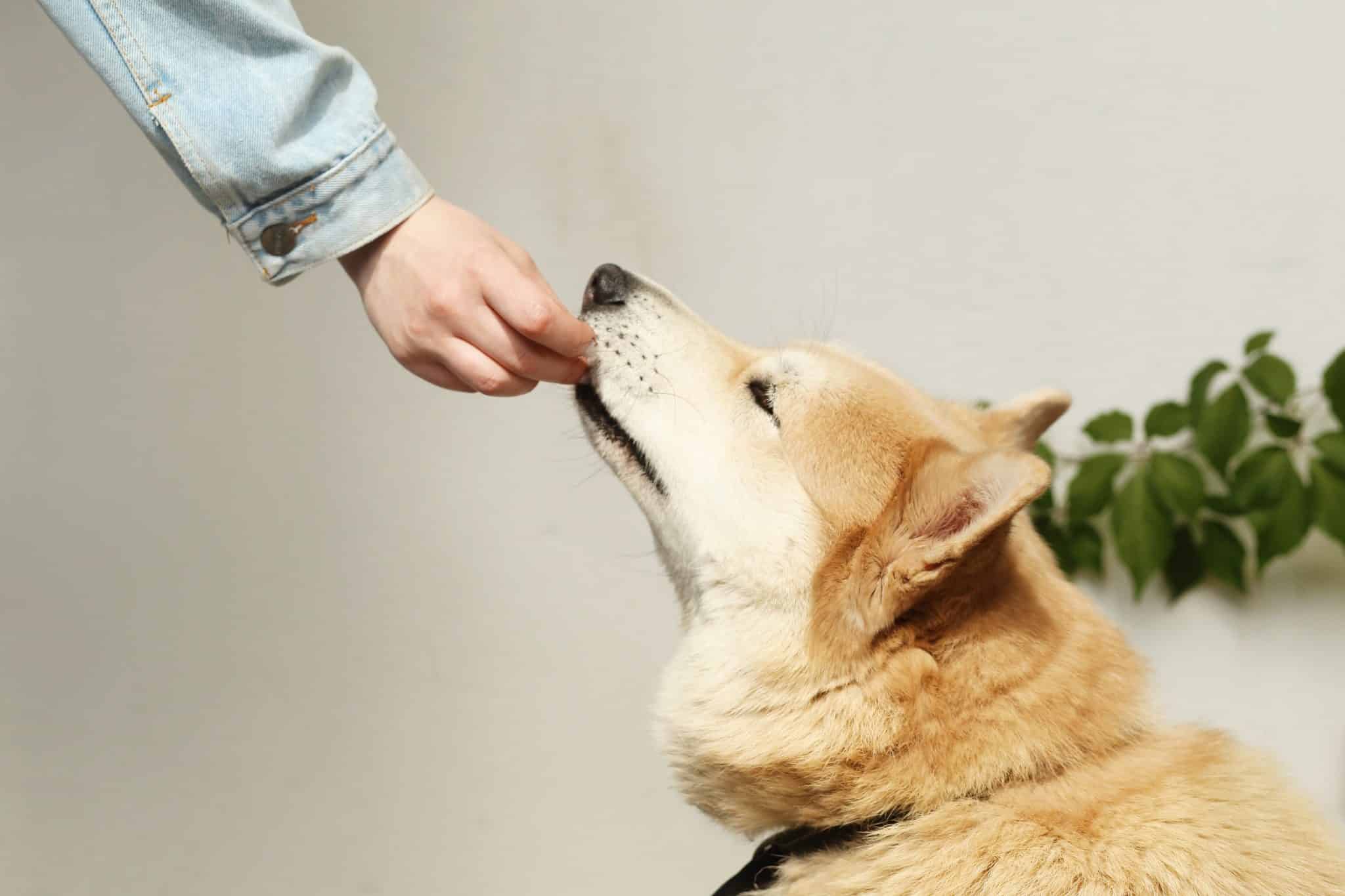
Green Light: Foods That Are Safe For Dogs
Fortunately, the list of human foods that dogs can eat is much longer. However, this isn’t an invitation to feed your dog solely from your plate.
Your dog should eat the following foods in moderation as an occasional snack or to encourage them to take medications.
- Apples
- Banana
- Berries (strawberries, blueberries, raspberries)
- Bread (cooked, with no spices, raisins, or nuts)
- Broccoli
- Carrots
- Corn
- Eggs (cooked)
- Green Beans
- Meat/Fish (cooked with bones removed)
- Melon
- Oatmeal
- Pasta
- Peanut Butter
- Pumpkin
- Rice
- Sweet Potatoes
- Zucchini
No matter how many times you feed your dog their favorite snack, however, continue to monitor them for new signs of an allergic reaction. It’s not uncommon for dogs to develop allergies to these ingredients.
If you’re curious about a particular ingredient, ask your dog’s veterinarian.
Nutrition For Dogs
As fun as it is to spoil your dog, it’s best to put their nutritional needs first.
Feeding your dog the occasional apple slice or green bean is perfectly fine (and significantly healthier than processed dog treats!), but try not to make a habit out of feeding your dog from your own plate.
For one, your dog may get used to being “hand fed” and might turn his/her nose up at their regular food. Those puppy eyes might be cute, but not when they’re begging at the dinner table!
Second, dog food is specially formulated to provide your pet with a balanced diet, featuring the perfect proportions of the vitamins and minerals they need.
Remember, you may have a lifetime of understanding the basics of human nutrition, but dogs are literally another species. Just because a meal is perfectly healthy for you, doesn’t mean it’s right for your furry friend.
Conclusion
The final word: dogs can eat human foods safely, but not all human foods.
Of course, the best way to keep your pet living their best life is to keep human food out of your dog’s reach and contact your vet if they eat anything off their regular menu.
If you want to give your dog the occasional treat, research the ingredient first to make sure you won’t be doing more harm than good.
Any questions? We can help! Our Altamonte Springs animal clinic is dedicated to keeping your furry family members in the best of health for as long as possible. Reach out online or give us a call at (407) 862-6892 to schedule an appointment.
Services
Or call us at (407) 862-6892
